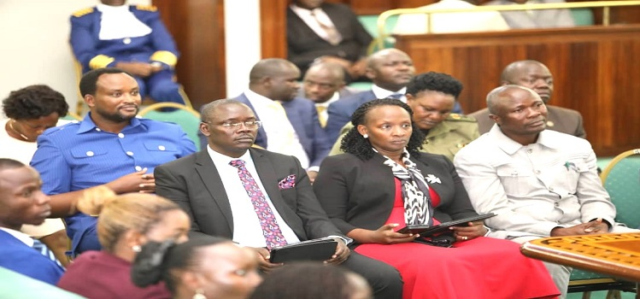
The Committee on National Economy will scrutinise government proposals to borrow funds to upgrade roads and finance the Climate Smart Agricultural Transformation Project.
The requests were tabled by the finance minister, Hon. Matia Kasaija, during the plenary sitting on Tuesday, 10 October 2023.
Government seeks to borrow US$295 million from the Islamic Development Bank and US$30 million from the OPEC Fund for International Development, to update the National Roads Project.
Under the project, government will contribute US$22 million.
According to the minister, implementation of the project will increase the stock of transport infrastructure, reduce freight transportation costs and reduce travel time.
The funds will facilitate the upgrade of 70 kilometres of Katine-Ochero Road connecting Soroti and Kaberamado districts, and will also include a link to the ferry landing site for the Bukungu-Kaberamaido-Kagwara ferry.
The loan will also facilitate the construction of Masindi Port Bridge as well as upgrading 68 kilometres of the Kyenjojo-Bwizi-Rwamwanja-Kahunge and 37 kilometres of the Mpara-Bwizi Road.
Kasaija observed in the proposal, that Uganda’s debt remains sustainable with the nominal value of public debt to GDP of 47.1 per cent as at June 2023, compared to 48.4 per cent as at June 2022.
Relatedly, to finance the Uganda Climate Smart Agricultural Transformation Project, government seeks to borrow US$325 million from the International Development Association of the World Bank Group, along with a grant worth US$25 million.
Under the project, government will contribute US$4.7 million.
The funds aim to reverse the country’s low agricultural productivity trajectory through investing in efficient irrigation, agricultural mechanisation and enhanced farm infrastructure.
The funding proposal by the finance minister indicates that the agricultural project will be implemented in 69 districts including seven refugee hosting districts in the six agro-ecological zones of Uganda.
Kasaija noted that the value chains promoted in the project are consistent with those of the Parish Development Model, and will benefit 13.4 million individuals directly and indirectly, including refugee hosting communities.
The Deputy Speaker, Thomas Tayebwa tasked the committees scrutinising the loan requests to report back to the House in time.






